Real estate management or property management is a difficult task for many people. It involves many moving parts, for instance, maintenance, taxes, tenant management, and security, to name some. For this reason, many people take the help of agencies and individuals to manage their properties. For example, Non-Residential Indians or NRIs make a good percentage of the real estate management inquiries. It is because managing their property while being overseas is not a workable option for most. It is one of the main reasons why more and more people seem to opt for professional real estate management services.

People hire real estate managers or property managers to maintain their properties while they are away or are not using them. At the same time, property managers also scout tenants for rental purposes. As a real estate manager or management firm, you will perform many complex operations that can be simplified using the right technology and tools. Let us delve deeper into how you can manage properties better and stay ahead of the competition.
What is real estate management?
Real estate management, also known as property management, is a practice of routine inspection and management of different types of properties that fall under the following categories.
- Residential
- Commercial
- Industrial
Usually, a third-party agency or an individual handles real estate management.
These property managers are responsible for repairs, ongoing maintenance, and security (day in and day out) of the properties they handle. They work with the property owners on a contractual basis. Property managers help maintain the value of the property and create new wealth for the homeowners in the process.
What are the different steps in real estate management?
For this article, we will focus on the organized residential real estate management segment in India. The following are the common steps in this type of management process.
1. Lead Generation

First, you must find prospective homeowners who are willing to list their properties for management. Data from the Global Web Index via Datareportal suggests that 81% of people search for a product or service online. Also, property portals report a 30-40% higher search activity for various properties than pre-Covid levels.
Hence, creating an enhanced digital footprint will help you generate more business opportunities. Focus on your digital marketing strategy and invest in lead generation channels such as social media, organic, channel partners, and more.
As stated earlier, many NRI homeowners need such services. Ensure that you factor in such people in your marketing strategy.
2. Customer Relationship Management
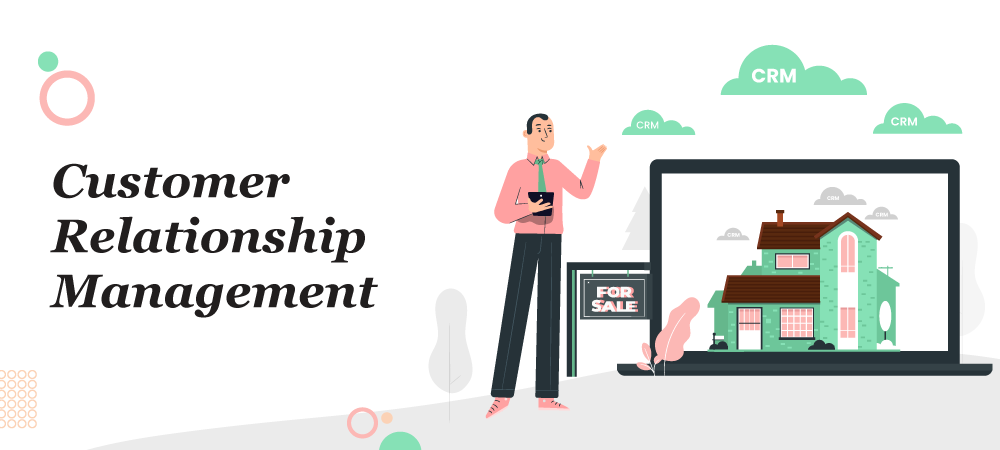
Reaching out to owners and tenants can be a tedious job. There will be many interested candidates who may not be eligible and vice versa. With a CRM software, you can:
- Automatically capture leads/inquiries from owners and tenants through various lead gen sources
- Understand the performance of these channels and identify which sources work the best for you.
- Maintain and manage inquiry-related data.
- Give your agents a centralized dashboard to manage the prospect-to-customer journey.
- Set up automated texts and emails to nurture the prospective tenant.
- Design the entire process flow in a few clicks.
- Track and analyze conversions through ready-to-use sales report templates
3. Visit the site and assess the investment required to manage the property
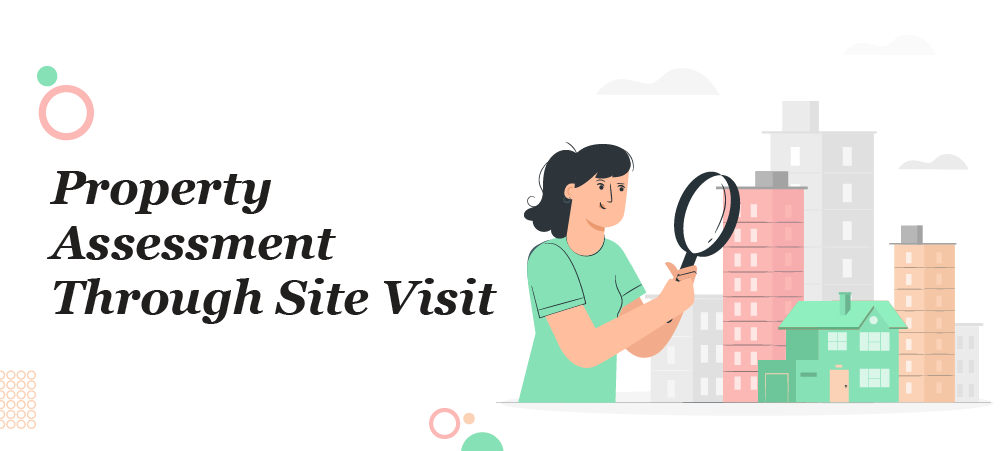
Upon generating a lead of the property owner, you must visit their property for an inspection. Based on that calculate the initial repair and utility costs to improve the property value.
Now, you may need these investments either in the long term or the short-term. Based on this understanding, you must identify and fix any issues before listing the property for rent/sale.
4. Property photography

According to SearchEngineJournal, 62% of people say that user-generated images of the product play an important role in their buying decisions. It is natural to want to know more about a product that you may be searching online. Hence, adding attractive images to the property profile will improve inquiry count.
You can also add images of amenities available at the property like swimming pool, open terrace, garden, and more. It will only raise the customers’ interest in the property and drive more leads.
5. Advertise on multiple channels

Here the lead generation is tenant facing. Register the property for rental on various digital channels, partner with brokers to drive leads for you. You can also list the property in offline media such as newspapers or leaflets.
You can also create referral incentives for any interested people. It will also create new business opportunities for you.
Once your channels start performing, you can directly funnel your inquiries into your CRM and track the entire lead journey from there on.
For example, you can list the property on Magicbricks and through LeadSquared-Magicbricks connector, capture all the leads into the LeadSquared Real Estate CRM automatically and distribute them to your agents.
Once your agents receive these leads, they can then follow-up, set reminders and close deals faster.
6. Connect with the prospective tenant and conduct site visits

In sales, reaching out to a lead immediately after they have put an inquiry increases the likelihood of conversion. In other words, the turnaround time, or TAT should be as low as possible. Calling a lead instantly will create a good impression on the tenant and will also help you to secure an important event (site visit) required to make a successful deal.
Using LeadSquared , you can send automated reminders to the prospective tenant and the agent responsible for this lead. It will reduce the instances of missed appointments and ensure that they go through the scheduled property visit.
During the visit:
- Walk them through the best aspects of the property
- Discuss all terms of renting
- You must understand the features of the “ideal property” the tenant is interested in.
7. Perform background checks
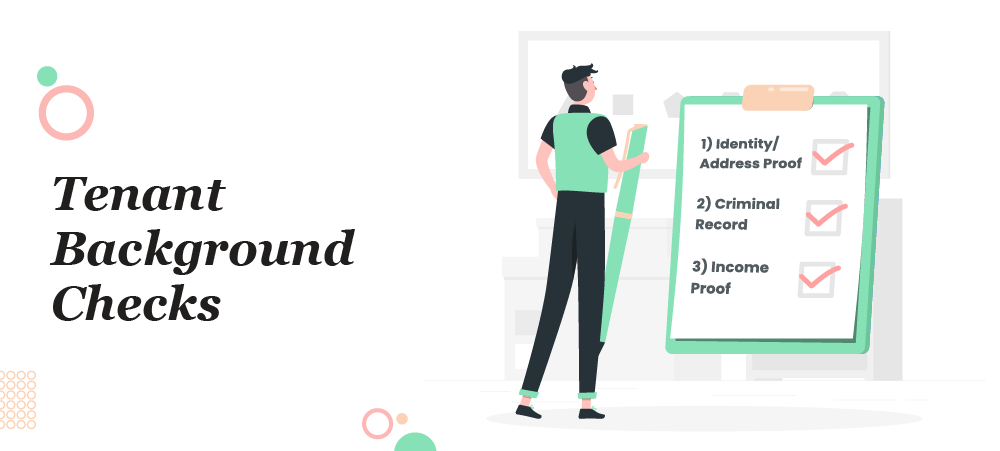
Once the tenant confirms their choice of property, loop-in the owner into the conversation. You can begin the documentation required to onboard the tenant. It includes:
- Identity/Address Verification: Identity proofs are mandatory documents. At the time of onboarding, tenants must submit address proof and identification proofs. The address proof can be of any other house of the tenant.
- Verification of Criminal Records: Ensure that you get the tenant vetted by police. It will help you understand if there are any ongoing legal cases against them. The police will verify the tenant in-person once the tenant submits the duly-filled identity proof documents.
- Employment and Income Details: Tenants with jobs must submit their employer details. It will tell you whether the tenant has a stable cash flow or not.
Based on these factors and other relevant documentation, you can choose to approve or reject the tenant application.
8. Help tenants move in/out and collect rents
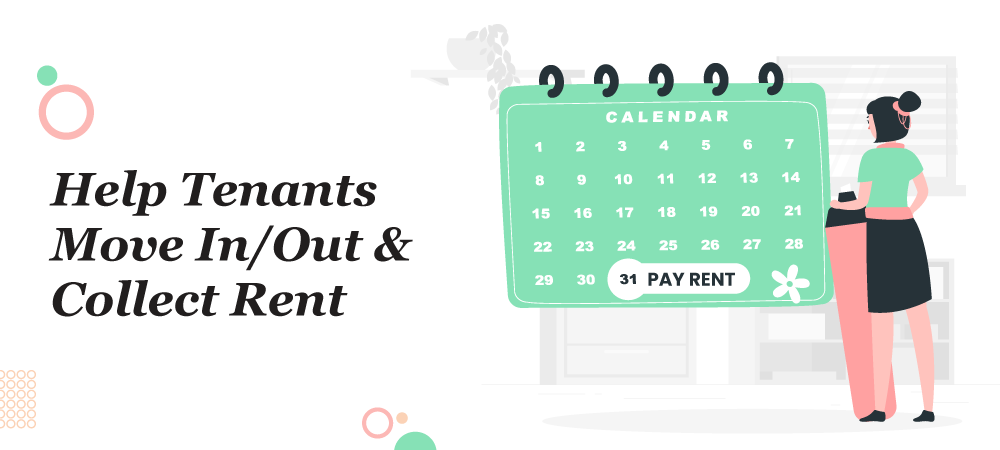
Although this is not a necessary step, you can help a tenant move-in/out to improve the customer experience. These days, people seek convenience. The homeowner or the tenant may choose to go ahead with a different property management service just because they provide some additional services like this.
Helping a tenant settle into the new accommodation may involve setting up utilities and transportation of the tenant’s belongings.
Post moving in, tenants have to pay security deposit. The security deposit compensates for any property damages that happen during the renting period. But in most cases, the security deposit is refundable. Since rent collection is a recurring activity, real estate managers can opt for automation. For instance, property managers who use CRM can set automated reminders for rent collection, send message to the tenant about the due payment, and set escalation in case of payment overdue. For effective real estate management, you can also ease the payment process with payment gateways and digital banking.
9. Resolve disputes (if any)

Sometimes tenant-related disputes may arise. As a property manager, you must resolve disputes through legal provisions discussed in the tenant agreement. If handled poorly, these cases can wind up in court. Tenants may also feel the burden of its consequences, more particularly the costs that they may not be able to afford.
A thorough understanding of the laws about tenant-landlord relationships is important to deliver the best customer experience.
10. Manage property repair and maintenance

Another crucial part of real estate management is repair and maintenance. There will be many instances when some existing or new damages may flare-up. At such times, you must deliver quick and hassle-free servicing.
Why quick and hassle-free?
Because it sets the expectations of the tenants about your customer service. The experiences will be the metric that other people will look towards before reaching out to you.
At the same time, a positive review from these happy customers is what will bring in more future opportunities.
11. Analyze and act on feedback
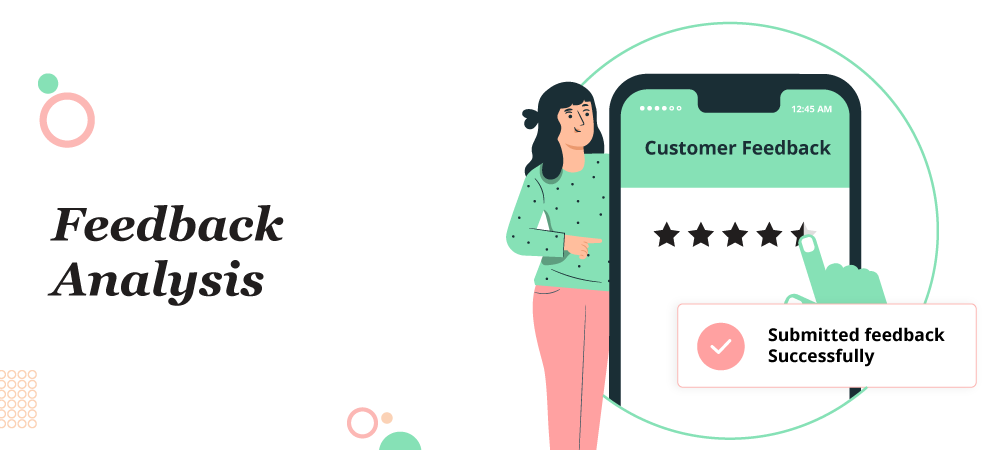
Feedbacks always help. Taking customer feedback for your services will help you introspect into the aspects that are most important to customers. For example, for some owners, getting regular updates about the state of their homes would be a priority. While for others, it may be the timely rent collection.
On the other hand, some tenants might want better onboarding services, while others may focus on how fast their complaints are addressed. Once you know what your customers want, you can improve your process accordingly.
Conclusion
According to MarketsandMarkets, the global property management market is expected to grow from USD 14.47 billion in 2018 to USD 22.04 billion by 2023. With the growth of digital infrastructure and increasing visibility for all players, you must keep the customer content and find avenues of improvement.
The points in this guide will help you polish your processes and improve your chances in the market.








